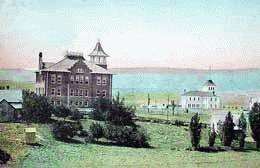On November 2, 1886, Douglas County voters agree to move their county seat from the waterless town of Okanogan to the growing small community of Waterville. Within two years Okanogan ceases to exist.
Okanogan was Douglas County's sole town at the time the county was created on November 28, 1883. (Note that this was a different Okanogan than the town of the same name in Okanogan County that became that county's seat in 1914.) The townsite was platted with the sole intent of creating a county seat since it was necessary to have one in order to create a county. J. W. Adams was the primary force behind the creation of both Douglas County and the town of Okanogan, but in his haste to launch the county he neglected to ascertain whether or not his townsite had available water.
By the spring of 1884, Okanogan had a small store that doubled as the Douglas County courthouse. A several houses and a hotel were completed during the summer of 1884 and in the autumn Okanogan was granted a post office. B. L. Martin, the storekeeper, was appointed postmaster. Postal business, like county business and grocery business, was conducted in Martin's store. Meanwhile several attempts to dig wells had proven futile: Even 60- to 80-foot holes produced no water.
Gone For Water
In the summer of 1885, Okanogan's few boosters made a last attempt to locate water, hiring a well-digging machine and boring 285 feet into the ground, but finding nothing. An Illustrated History of the Big Bend Country, published in 1904, describes the sorry scene in Okanogan that summer:
"From that time on Okanogan was doomed. Where before settlers were pouring into the country in response to the glowing accounts of the country as advertised by Adams, Mann & Company, they now would come, gaze down into the earth 285 feet, and then leave the country. Prospective settlers who came to the vicinity of Okanogan with the expectation of finding things as advertised, were led to believe that the whole country was in the same predicament, and many did not stop to investigate in other portions of the county, but immediately pulled out ... one of the stories these disappointed homeseekers would tell in all seriousness was to the effect that it was a customary sight to see posted on the doors of the settlers' cabins the sign: 'Gone for water; will be back in a week' " (p. 534).
Looking For A Drop To Drink
In the spring of 1886, Richard Meyers, a member of the Douglas County board of commissioners, launched an attempt to move the county seat to the bank of a lake near where the town of Douglas would later be established. This somewhat desperate move was deemed illegal since it did not include putting the question to a public vote. An Illustrated History of the Big Bend Country states that the other commissioners "evidently were aware that the removal would not be in accord with law no matter how badly they were in need of water" (p. 539).
Meanwhile A. T. Greene and J. M. Snow, after having dug a gratifyingly gushing well, platted a new town they named Waterville and began lobbying Douglas County residents to name it county seat. Town boosters hauled a large barrel of water to the 1886 county Democratic convention at Okanogan. The water in the barrel was intended to prove the veracity of the new town's name. Waterville residents promised that the county offices could be provided free of charge for the first two years if Waterville was named county seat. Okanogan residents countered by labeling this offer a bribe and therefore illegal under Washington Territorial law.
Other locations under consideration in the county seat race included the city of Douglas and the location that would later become Coulee City.
A Tall Glass of Water(ville)
When the votes were tallied, Waterville emerged the clear winner with 112 votes. Douglas City (located on a lake) garnered 56 votes; Okanogan 7 votes; Oneida 1 vote; and the future Coulee City site, (identified as section 3, township 24, range 28, east), 5 votes. Seventy-five votes were cast for Grand Coulee and several for Grand Coulee Crossing but these votes were discounted. An Illustrated History of the Big Bend Country explains, "Grand Coulee, as popularly interpreted, was a huge gash in the earth some 50 miles long and of indefinite width. A county seat located at 'Grand Coulee' might be anywhere in that territory. The vote for Grand Coulee Crossing was thrown out on similar grounds. The commissioners maintained that there were a number of Indian trails across Grand Coulee and that they could not determine which one of these was meant" (p. 541).
Douglas County commissioners met in Waterville for the first time on May 3, 1887. Okanogan's few residents were at first reluctant to allow county records to be removed from their town. Eventually the Fourth Judicial District court issued an order instructing county sheriff S. C. Robins to remove all county items from Okanogan to Waterville. An Illustrated History of the Big Bend Country describes these items as "a stove, a home-made table, the commissioners' journal, and a very few books and papers of record" (p. 543).
Okanogan's few residents sold their buildings to nearby ranchers and moved on, effectively erasing Douglas County's first seat from future maps.

